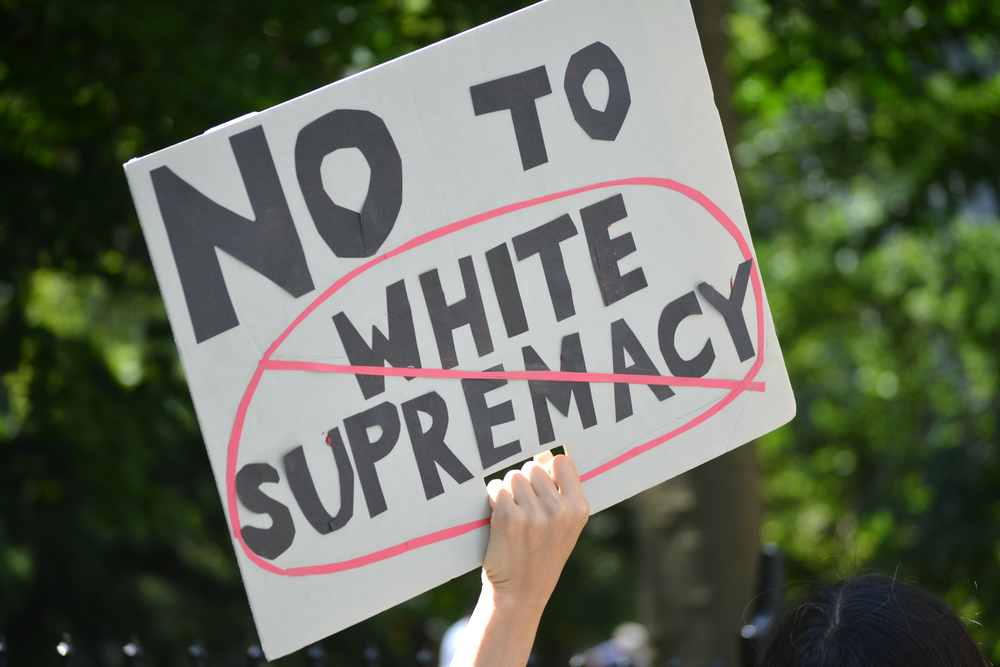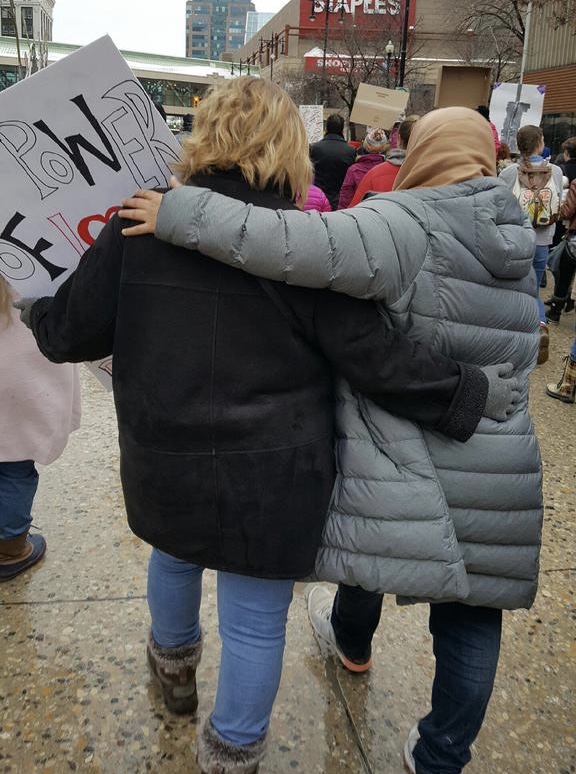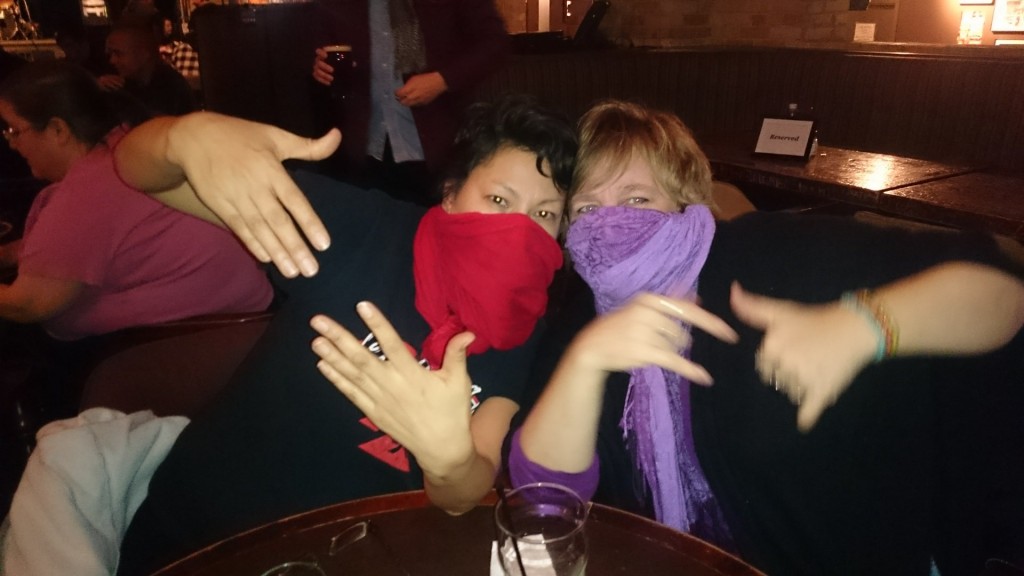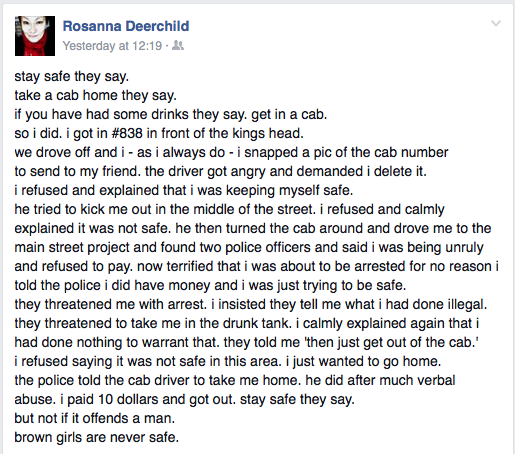by Heather Plett | Aug 17, 2017 | Uncategorized

Everyone is talking about what happened in Charlottesville last weekend, but the problem with much of the response to this event is that it gives us a clear “them” to vilify. “Those horrible neo-nazis and white supremacists. Can you BELIEVE what they’re doing and saying?”
When we isolate them and their extremism, we miss the point that white supremacy is part of our culture and it’s something that ALL WHITE PEOPLE benefit from.
“The overtly racist White Supremacists marching in Virginia are not a part of a binary, they’re part of a scale. When we capitalize the words “White Supremacy” and treat it like a monstrous philosophy, it is an extreme that can be handily rejected by the majority of whites.
“However, on the same spectrum, less extreme, are the various forces that lead to the overrepresentation of whites in nearly every desirable facet of society, and to the contempt and distrust with which POC are seen. We have decided to call these things “white privilege,” but one rarely mentioned aspect of white privilege is the privilege to use language to pretend it isn’t white supremacy. Richard Spencer and his ilk are the id, not an aberration but rather a natural byproduct of unchecked white privilege.” From the article Why Privilege is White-Washed Supremacy.
If we all benefit from it, then we all must participate in dismantling it. This is not just a leadership problem (though good leadership would certainly make a difference). It’s not just an American problem (there’s lots of racism here in Canada too). It’s a problem that every one of us can participate in addressing.
Here are some things that you can do to help dismantle white supremacy. (Note: this list is meant primarily for white people and it emerges out of my own years of wrestling with my whiteness.)
1.) Do an inventory of how white your lens and life are. Do you surround yourself with white friends? Are your bookshelves full of books by white writers? Do you primarily watch TV shows and movies with white people in them? Are you doing business with, banking with, signing up for courses with, and hiring mostly white people? If so, ask yourself what you need to do to change the fact that you are centring whiteness.
2.) Listen to, read, and amplify the voices and wisdom of people of colour. Commit to reading only books written by people of colour for a year. Share at least one article each day on social media written by a person of colour. Sign up for courses with people of colour. Follow them on social media. If you have a public platform, share it regularly with voices that your audience needs to hear from.
3.) Buy from and amplify businesses owned by people of colour. You can do a lot of good by being more intentional about where you spend your money. Do your research and search out businesses owned by and run by people who look different from you. And then tell all of your friends about where you’re spending your money, not as a way of bragging about how socially conscious you are, but as a way of promoting these businesses and supporting their success.
4.) Consider the power of your vote. Do your research about the people you’re voting for. If you can, support people of colour running for political office (if they represent your political views). If the candidates in your neighbourhood are white, then at least talk to them about what they’re doing to address racism and white supremacy. Don’t just take their word for it – find out who they’re hiring, who they’re engaging in their campaigns, and who they’re doing business with for a better picture of how white their lens is.
5.) Talk to your racist neighbours, friends, family members, grocery store clerks, bus drivers, etc. Stand up for the people they dismiss. Challenge their attitudes. Invite them to multi-cultural events or lectures where they can expand their thinking. Don’t just ignore it because “they’re otherwise such kind people.” When you’re silent, you are complicit.
6.) Talk to the children in your life about racism and white supremacy. Point out the areas where they are benefiting from white privilege. Have hard conversations about news stories like Charlottesville. Model for them by letting them see you reading books by people of colour, having meaningful friendships with people of colour, voting for people of colour, and challenging your racist relatives. Help them develop strategies for addressing the racism they may be witnessing in their schools, sports teams, etc. (AND, when they grow up and start learning things you don’t know and listening to voices you haven’t heard, be willing to learn from them.)
7.) Research and send money to non-profits run by and working with communities that have suffered from oppression/colonization/conflict/etc. Non-profits that are run by white people, that have mostly white people on the board and on staff, etc. may be upholding white supremacy by not including the voices, wisdom, abilities, etc. of the people they say they’re serving. Note: I specifically said “send money”, because if you choose to send them the physical items YOU THINK they need, then you are taking their autonomy away. Unless they ask for specific items, let them make their own decisions by giving them money to spend as THEY see fit.
8.) Stop spiritual bypassing or other avoidance techniques and dare to peer into the shadow side of our culture. If you believe in “love and light” than dare to shine that light into the darkness of racism and white supremacy rather than trying to pretend that “we are all one race” or “I don’t see colour”. The fact that you have the option to avoid this kind of negativity is a sign of your privilege. Your spirituality is selfish if it lets you “rise above” the ugliness of the world.
9.) Learn to sit with discomfort. Do the personal work (mindfulness, therapy, coaching, etc.) that will build your resilience and help you deal with negative emotions in a more healthy way. If you are always running away from fear, shame, anxiety, etc. then you won’t have the courage to step into difficult conversations where you might be challenged for your white privilege, covert racism, etc. If you shut down every time someone expresses an opinion different from yours, then you’ll stay in your little bubble and not contribute to the change this world needs.
10.) Find places for conversations and meaningful action. Join an ally group that supports the causes of people of colour (eg. SURJ). Start a conversation circle where you can wrestle with the hard conversations. Seek out Facebook groups or other social media forums. DON’T rush in to do what YOU think needs to be done – instead, follow the leadership of the people most impacted by the issue and LISTEN.
by Heather Plett | Feb 1, 2017 | Friendship, growth, holding space, Leadership, Uncategorized

1. Safety – my privilege
The atmosphere was rather festive as my daughters and I made banners for the women’s march. They’re not new to political activism, having been raised in a home where political dialogue is as common as mashed potatoes, but this was the first time all four of us were going to a march together and the first time we were all making our own banners. One chose a Star Wars reference and another chose Hamilton – their pop culture of choice. They dressed up and I teased them with “this is the resistance – not a fashion parade.” They retorted with “Feminism has evolved, Mom. Our generation believes we can look cute AND resist at the same time.”
On the way downtown, we picked up Saleha, a Muslim friend who’s lived in Canada for 10 years. She was excited and passionate about the march – her first political action of this kind.
The meeting place quickly filled with thousands of marchers – predominantly white women, some wearing pink pussy hats, some holding signs. As people gathered, one of the organizers announced that an Indigenous elder would be smudging whoever was interested. Saleha was eager for the opportunity, so we got in line. I stood by and watched a beautiful moment unfold – Saleha opening her hijab like a tent to let the smoke touch her face and her ears, while the elder offered gentle guidance. When Saleha turned away, the emotion on her face told me how moving it had been.
Leaning on a rail on the second floor of the meeting space, we watched the speakers and drumming group on stage. A mix of intersectional voices – Indigenous, immigrants, transgender, and women of colour – inspired us to consider ALL human rights, not just those that have been too often centred in marches like these (able-bodied, cisgender, heterosexual white women).
Slowly, the crowd made its way onto the street. As soon as we stepped onto the street, I sensed something had changed in Saleha’s demeanour. I turned toward her. “Are you okay?” I asked.
“No,” she said. “Suddenly I don’t feel safe anymore.”
“Would you like me to hold your hand?” I asked.
“Yes, I think I need you to,” she responded.
Holding hands, we followed the crowd. Looking around, I tried to find at least one other woman on the street in a hijab, but I could see none. Nor were there many women of colour or Indigenous women. It was mostly women who looked like me – a crowd of white feminists, probably mostly unaware of who was missing. Did all of those other, more marginalized women, avoid the march because they sensed the same feeling of insecurity that was coming up for Saleha?
More than once I turned to her and said “If it feels unsafe to be here, we can step out and leave the crowd.”
“No,” she said. “I want to do this. I’ll stay in it as long as I can.” We kept walking and the stories began to spill. “It’s illegal to protest like this where I come from,” she said. “I once witnessed a friend yanked off the street by the authorities. We didn’t see him again after that.”
“The day after the Paris attacks, I was waiting for a train in Amsterdam when a man shoved his face just inches from mine and started verbally attacking me. Nobody stepped in to stop me.”
On and on it went – the many times she had felt unsafe, just because she was a woman on the street wearing a hijab. The airport security checks when customs officers discovered her last name was the same as one of the 9-11 terrorists, the times she’s dropped her children off at school and teachers or other moms ignored her until they realized she spoke English like them, the drunk man on the street who told her to go back home in front of her children.
“I don’t know why these are all coming up right now,” she said. “Each time something happened, I stuffed it away and told myself I was okay. It was the only way I could carry on – to convince myself I was safe. But I’m not safe. Since coming to Canada, I’ve done everything I can to blend in and to convince people that I’m not a threat. I worked so hard to learn English. And now I will probably cancel my post-grad studies in the U.S. because I’ll be even less safe there.”
More than once, as we walked, she apologized for saying things that might make me, a white woman, feel badly for what people like me had done or said to her. “I don’t want to be somebody who blames white people.”
“Stop,” I said. “You don’t need to apologize. If I am your friend, I need to be able to hear the ways that you feel unsafe around people like me. Even if it makes me uncomfortable, I need to listen. You are not responsible for looking after me in this situation.”
“But I’m not used to this kind of conversation,” she said. “I am much more used to doing whatever it takes to make white women like you feel safe.”
As we walked, I glanced ahead to where my daughters walked, and was suddenly hit with these two realizations:
- I and my daughters never once considered that we might be unsafe on the street. My safety to march is just one of the many privileges I take for granted. So is my safety to go grocery shopping, to drop my kids off at school, and to ride the bus without being verbally attacked. Although there are some places I wouldn’t feel safe, especially at night, I have access to enough privilege (ie. my own vehicle, a house in a relatively safe part of town, etc.) that I rarely have to place myself in situations where I am at risk.
- Although I consider myself to be as non-threatening as a person could be, my white skin and my place within the dominant culture make me unsafe for some people. In order to stay safe themselves, others often need to contort themselves in order to make me feel safe. White women like me might present a particular risk because we’re the ones that the police would probably respond to most quickly if we were feeling threatened.
2. Safety – my cage
My friend Desiree is fierce and bold. She says things on her Facebook stream that I don’t have the courage to say and she doesn’t apologize if people take offence to them. Rather than coddling people, she expects them to take responsibility for their own emotional response.
We are quite different in our communication styles and I’ve often wondered about the many factors that contribute to that difference. I chalk up my more conciliatory, sometimes timid communication style to my pacifist, Mennonite, Canadian roots, but lately I’ve considered that it may be more than that. We may have been intentionally conditioned differently by the patriarchy.
For nearly seven years now, Desiree and I have been having periodic conversations about the ways in which we’ve learned to respond to the world differently. As a Black woman living in the southern U.S., her lived experience is quite different from mine. We’re passionate about many of the same things, but we came to these issues from different directions.
After the women’s march, Desiree and I talked about what the march represented, what happened during the march, whose voices were heard, etc. One of our most profound conversations was about the images on social media that portrayed police officers wearing pink pussy hats at the marches.
“When white women show up to protest,” Desiree said, “police wear pink pussy hats. But when people of colour show up to protest, they wear riot gear.”
We went back and forth about what that meant. Did the police just assume that, because the Women’s March was predominantly white women, there would be no danger involved? Was it a purely race-related difference?
And then, something new emerged in our conversation – the possibility that the police were serving as agents of the patriarchy, keeping white women in line by appeasing them and convincing them they were there to protect THEM from outside forces rather than protecting OTHERS from them. When they show up with riot gear, they’re protecting the community from the protestors. When they put on pussy hats, they’re signalling that they’re protecting the protestors.
And that, we theorized, is one of the reasons that there is fragility among white women (and why someone like me might adopt a more timid, conciliatory communication style) – because we have been conditioned by the hierarchy to believe that our fragility keeps us safe. As long as we are fragile, the patriarchy protects us. When we are no longer fragile, the patriarchy withdraws its protection and we are at risk.
The patriarchy benefits from the fragility of white women.
Women of colour, on the other hand, don’t have the luxury of being fragile. They are taught to survive at whatever cost, usually by their own means and without the help of those in authority. They don’t grow up assuming that the police will protect them if they are fragile. They grow up with images of the police protecting the community from them, not the other way around.
This is how the patriarchy keeps us both in line – by keeping us separate and at odds. It’s the same way that apartheid worked in South Africa. The white establishment created fractions between the local tribes, giving some more access to education, jobs, etc. When they were fighting amongst themselves, they did not present a threat to those in power. If you look around at the places where women are gathering to develop political actions such as the Women’s March, you’ll see the same kind of dissension. Groups with differing access to privilege, power, and protection have a hard time hearing each other’s concerns.
(I would add that those police officers in pussy hats and riot gear are also being controlled and wounded by the patriarchy, though they probably don’t recognize it. It’s a flawed system that is doing damage to us all.)
Two more realizations:
- Fragility in white women is real AND it’s tool of the patriarchy in order to keep us silent and weak. If I don’t challenge it in myself, I stay trapped and nothing changes.
- If I place too high a value on my own safety, I won’t risk stepping into conversations that make me uncomfortable and I won’t be able to build better relationships with women of colour and other groups that have been oppressed by the patriarchy.
3. Safety – my right
A few days ago, I was part of a text conversation of another kind. My friend Jo shared that she had been verbally abused in a conversation on social media. She’d been invited into a conversation about whether or not patriarchy is real, and though she intuitively felt unsafe as the only women surrounded by opinionated men, trying to explain something that they had all benefited from, she took the risk because she cared about the person who invited her. She stated her discomfort, but that discomfort was used as a weapon against her to make her feel shame for wanting a “safe space”.
Jo’s story reminded me of the times when I too have felt unsafe, trying to explain sexism or discrimination to those who had more power than me. Several years ago, I wrote a letter addressing some sexist behaviour on the board of an organization I was part of and I sent it to the three men I thought needed to be aware of it. My letter was ignored by one, dismissed by another, and responded to only with a back-handed comment by the third. I was left feeling small and ashamed for “over-reacting” and unsafe to raise any such concerns again in the future.
I know, from listening to my friends who are Indigenous and people of colour, that they feel similarly when white people ask them to explain racism, or when they need to challenge racism in their workplace. It is unfair to expect the people who’ve been oppressed to explain to those who’ve benefited from the oppression. It puts them in a dangerous position where they are often targeted with more abuse for “over-reacting”, “being too sensitive”, etc. Some people even lose their jobs for daring to challenge the system.
Though I have to recognize safety as my privilege and my trap, I also believe that it is a human right. Those who dismiss my safety as irrelevant or who tell me I’m over-reacting and need to calm down are attempting to gaslight me – making me think that I’m crazy or weak for needing safety. That’s how oppressors win.
As I mentioned in my last post, trauma further complicates this issue. Unhealed trauma convinces us that we are unsafe even when we aren’t. And much of that trauma is hard to pinpoint because we may have inherited it or it may have been caused before we were old enough to know what was going on. The fear that comes up when a trauma memory is triggered is as real as the fear we felt when the trauma happened.
Two more realizations:
- Next to air, water, and food, safety is our most basic need. We will do almost anything to find safety, including contorting ourselves in the presence of those who make us feel unsafe. Those who’ve been oppressed are usually masterful at contortion, and if they’re not, they are at greater risk.
- When we have experienced trauma, our need for safety is easily triggered and our bodies respond with fight, flight, or freeze. Often we don’t recognize that we are being triggered and then it’s easy to feel shame for over-reacting. Those with more power usually don’t recognize (or choose to ignore) that they are triggering our fear and our shame because their lived experience is very different.
Note: All three of the friends mentioned in this post gave permission for their stories to be shared.
*****
Interested in more articles like this? Add your name to my email list and you’ll receive a free ebook, A Path to Connection and my bi-weekly reflections.




